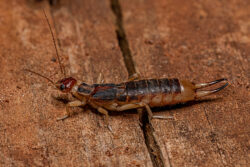Pincher bugs are another name for earwigs. They get their nickname from the pincer-like appendages on the ends of their bodies. What are these common household pests and should you worry about them? Here’s all you need to know about pincher bugs.
The name earwig comes from an old wives tale that these pests crawl into human ears and lay eggs, although there is no scientific evidence to back this up. Pincher bugs are nocturnal scavengers, sleeping during the day and hunting at night. In fact, they spend their entire lives looking for a hospitable place to live and searching for food. They have no queens and no colonies and are, in fact, very antisocial pests.
On average, a pincher bug lives for about a year. They mate in autumn and winter and their eggs hatch in the spring. Earwig season runs from late spring through the summer. In the winter, they will go underground until the ground starts to warm up again.
Pincher bugs prefer moist, cool environments to live in but thrive in areas of the country where the climate is warm. They are found in most southern states.
These pests have a set of pincers that protrude from their abdomen which they use to:
- fight off predators (birds, lizards, frogs, centipedes, spiders, yellow jackets)
- catch prey
- perform mating rituals
- differentiate between males and females (males have curved pincers while females have straight, narrow pincers)
They are attracted to bright lights and will commonly be found on porches and patios where lights are on at night. They are attracted to moisture and can often be found in basements, bathrooms, and laundry rooms. They are also attracted to oily, greasy, and sweet foods.
These pests are not harmful to humans and can be beneficial to have around. They eat other insects, along with dead and decaying plants. They can be of great help to clean up and maintain your gardens.
If you find a pincher bug, there are several ways you can get rid of them:
- Pesticides. Diatomaceous earth, permethrin, bifenthrin, and pyrethrin are known to work on these pests.
- Drowning. Solutions made of soap and water, alcohol-based mixtures, and oil-based liquids will work.
- Vacuum them up.
- Squish them with your shoe or other object.
- Natural predators. Encourage natural predators to frequent your yard, such as birds (birdhouses and birdfeeders), frogs, and centipedes.
If you have a problem with any common Florida pests, contact your local pest control company for an evaluation.



